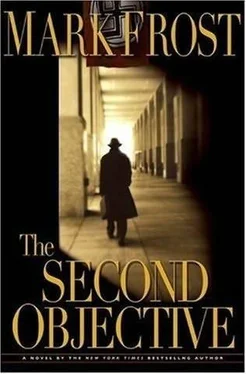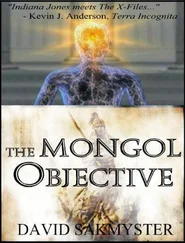Von Leinsdorf grabbed him by the collar and pulled him close. “I can be your friend, Brooklyn. In spite of our differences, after what we’ve been through I like to think that I am. But don’t suggest that again.”
Von Leinsdorf released him and put the passes back in the envelope.
Friend . That wasn’t a word Bernie had ever used in relation to Erich Von Leinsdorf. There had been moments when he felt they could get along, even stumble toward some understanding of each other, and the man had just saved his life. But the question stuck: Did their mission demand this violence from him-seven killed now in two days-or give him an excuse to indulge it?
“This other objective,” said Bernie. “You going to tell me what it is?”
“Why should I trust you, Brooklyn? Do you trust me? After Schieff and Preuss, I don’t think so.”
“Guy gets the sniffles around you, he ends up with a bullet in the head.”
Von Leinsdorf pointed an emphatic finger at him. “They endangered our mission. Nothing else matters. We don’t need them now anyway.”
“What does that mean? You need me, so I get to live?”
“Put it any way you like,” said Von Leinsdorf. “I can’t complete the assignment without you. Go pack up the jeep, I’ll use the radio.”
Once Bernie left the room, Von Leinsdorf used the radio to contact his other squad leaders, Gerhard Bremer and William Sharper. Both squads had evaded capture through the first days of the invasion and picked up their corrected SHAEF security passes from the Abwehr . Von Leinsdorf told them that they were to move south into France, as scheduled, and pursue the Second Objective.
Karl Schmidt’s squad failed to respond, but Von Leinsdorf considered that a plus; the man was a weak-kneed intellectual and chronic complainer. They were better off without him. He would have been no help at all where they were going.
The Bridge at Amay
DECEMBER 17, 7:00 P.M.
Grannit and Carlson secured their four prisoners and sat them down behind the sandbag emplacement while the bridge detail stood watch. Carlson radioed headquarters about the arrests. Grannit searched their jeep. After assembling the evidence he found in an empty ammunition tin, he walked back to the prisoners.
“You’re in charge, right?” he asked their captain.
The man nodded.
“Take a walk with me,” said Grannit, gesturing toward the bridge.
The German stood up and started ahead of him. Ole Carlson hurried out of the radio tent as they neared the bridge.
“Command says bring ’em in to First Army Interrogation,” said Carlson, falling into step with them. “They want Army Counterintelligence in on it, we should get ’ em there ASAP -”
“I won’t be long,” said Grannit.
“They said they don’t want to wait, Earl-”
“Give me a few minutes. And stand by for that other thing we talked about.”
Carlson gave the German next to Grannit a long look. “Whatever you say.”
Ole pulled his sidearm and walked back toward the other prisoners. Grannit waved the German on ahead of him. The man looked back at Carlson, concerned. Grannit shoved him forward and told him not to turn around. By the time they reached the middle of the bridge, it was nearly pitch black.
“Stop here,” said Grannit.
Grannit set the ammo box down on the ground between them, turned on a flashlight, and pointed it at the German. He had a long, intelligent face, and was trying at the moment to put up a hardened front.
“Let’s get one thing straight. There’s enough in that jeep to hang you five times. Unless you think you’re going to pass these off as souvenirs.” He held up a pair of red armbands with swastikas. “I ask questions and you answer them, got that? What’s your name?”
“Karl Heinz Schmidt.”
“What’s your rank?”
“ Oberstürmführer . Lieutenant.”
Grannit held up the dog tags he’d taken earlier from the man’s neck. “Who’s Captain Ted Harlan?”
“I have no idea.”
“Did you kill him?”
“No.”
“Why are you wearing his tags?”
“They were given to me. I assume he must be an American prisoner of war.”
“What unit are you with?”
“The 150th Panzer Brigade.”
“Who’s your commanding officer?”
Schmidt hesitated. “Colonel Otto Skorzeny.”
Grannit recognized the name from military briefings, but showed no reaction.
“So what brings you to Belgium, Karl?” asked Grannit. “Sightseeing? Little vacation?”
“Could I have a cigarette, please?”
Grannit handed him a pack. Schmidt’s hands were shaking as he tried to light a match.
“My understanding under the accords of the Geneva Convention, to which both of our countries are a party, is that I am required to give you only the information you’ve already requested. Nothing more.”
Schmidt tried to meet his eye with resolve. Grannit took a step closer to him.
“Here’s the truth: I don’t know shit about military procedure. I’m with a special investigative division and we do things differently, so let me put it on a plate for you: You got pinched behind our lines wearing an American uniform. The book says that makes you a spy and all bets are off. They teach you what that phrase means, Lieutenant Schmidt, all bets are off?”
Schmidt shook his head. Grannit took another step forward until they were nose to nose.
“It means I don’t give a fuck. So you tell me what I want to know or I’m going to hurt you. I’ll start with an easy question. How many other men are in your squad? How many were with you in that jeep?”
Schmidt appeared confused. “Three.”
Grannit waved the flashlight back toward the edge of the bridge, switching it off and on. A moment later, a single shot rang out, followed by a scream, then another shot. Grannit turned back to Schmidt.
“I think it’s two now,” said Grannit.
Schmidt’s knees buckled slightly. He backed up a step and went pale.
“You want a heads-up on your next few days? Military Intelligence questions you, you go before a court-martial and then a firing squad, and the court-martial’s a formality.”
Schmidt took another step and staggered when he felt the wall of the bridge behind him.
“Nobody on this side’s going to defend you or care what happens to you, and nobody on your side’s ever going to hear about it. The one chance you’ve got is to cooperate and tell us everything you know. If you don’t come clean, I’ll save everybody the trouble and drop your ass off this bridge right now.”
Schmidt went down onto his haunches, head lowered, breathing in jagged bursts.
“You don’t strike me as a stupid man,” said Grannit. “I don’t want to lean on you if I don’t have to. You’re not a soldier, are you, Schmidt?”
Schmidt shook his head. Grannit knelt down next to him and lowered his voice, radiating sympathy.
“I didn’t think so. You have a family?”
“Yes,” said Schmidt. “A wife. Two boys. Twins. They’re not even ten years old.”
Grannit took out a notebook and pen and waited. “That’s who you should be thinking about now. I can’t make any promises but this: I’ll do what I can for you.”
Schmidt rubbed his eyes, struggling to compose himself. “We were part of a special brigade. Those of us who came over in American uniform. Our company was going to assemble here.”
“To capture the bridge?”
“And two others, nearby, by to night.”
“So where’s the rest of your brigade?”
“I don’t know. We were sent ahead to scout. When the others came, we were to secure the bridges for the main offensive. We had tanks. Some captured American. Panzers and Panthers disguised to look like Shermans. We have also motorized artillery, antitank guns, three mortar platoons, an armored reconnaissance group, a full supply column-”
Читать дальше












